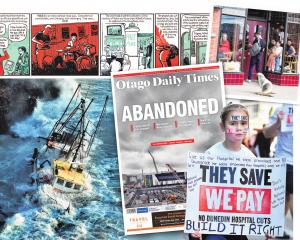The Dunedin City Council is set to make a final decision tomorrow on whether to dump investments in fossil fuel extraction.
The vote comes after councillors were hailed as visionary when they voted in favour of an ethical investment policy, which also includes divesting from investments in tobacco, arms, gambling and pornography, for the $82.5 million Waipori Fund.
While the move prompted praise in some quarters, councillors who voted against the policy were concerned at the cost to ratepayers - estimated to be about $500,000 a year based on the performance of the fund over 13 years from the year 2000.
As a result of last year's vote, council staff have developed a socially responsible investment policy, which councillors will vote on tomorrow.
If councillors vote in favour of the policy, it would come into force immediately, after which it would divest using a ''phased approach'' in no more than two years.
Cr Jinty MacTavish said she was ''excited'' at the vote, which was an opportunity for the council to stop investing in industries Dunedin residents had indicated they did not want to support.
At the moment, the city's residents were effectively being ''forced'' to invest in areas a significant number had concerns about, Ms MacTavish said.
She was also keen to point out the estimated impact of about $500,000 per year was based on performance over the previous decade, saying it was ''dangerous'' to extrapolate from past trends when it came to financial markets.
The performance of those shares, in particular in fossil fuels, would be different in the next 10 years.
She was unsure whether the vote would pass, saying it was a close vote last time.
Cr Hilary Calvert, who voted against divestment last year, said she could understand why others supported the policy, but divestment was a luxury the council could not afford.
''We are a very poor city,'' Cr Calvert said.
Apart from being a ''poster child'' for divestment, she questioned whether the benefits of divestment would be as great as proponents suggested.
She would be voting against the policy, but believed it would pass, in part due to the council report giving ''false hope'' about how much the policy would cost the council.
The policy would likely cost it less than the estimation by Russell Investments of about $500,000 per year , but the council would likely take a hit worth ''millions'' in the next decade if it was approved.
Group chief financial officer Grant McKenzie said in a report, to be tabled at tomorrow's meeting, the advantages of adopting an ethical investment policy were not ''necessarily financial'', although it was possible divesting could result in an improved performance.
''A key advantage is that the council would be taking a principle-based decision in the local government sector around socially responsible investing.''
A disadvantage was a possible increase in volatility in the fund.
However, he pointed out ''historic returns are not an indicator of future returns''.












